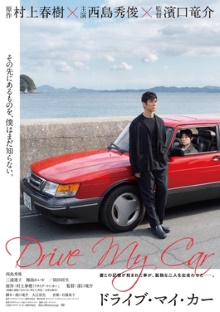I’ve never watched a film by Ryusuke Hamaguchi but in 2021 he shot to prominence by releasing two critically acclaimed film practically back to back. It took a while to get around to watch this, it being a three-hour film and I’m very glad when I did. This is exactly the kind of quiet, contemplative film that I like and it’s even a chance to get to know the work of Haruki Murakami a little. I don’t actually remember much of Vanya on 42nd Street but I did find it useful to understand a little more about the play at it center. I really enjoyed how dense this is with stories, meanings and subtleties.
Yūsuke Kafuku is a theatre actor who is married to Oto, a television screenwriter. One day Kafuku returns home unexpectedly early after a delayed flight and sees Oto having sex with Kōji Takatsuki, a younger television actor who works with her. He chooses not to disturb them and pretends it never happened. Shortly afterwards Oto dies of a brain hemorrhage. Two years later Kafuku is in Hiroshima to direct a production of Uncle Vanya for a theatre festival. Among those auditioning is Kōji who Kafuku casts in the lead role. One of the conditions the festival organizer imposes is that Kafuku isn’t allowed to drive himself around. Instead they hire a young woman, Misaki Watari, to be his chauffeur. Kafuku is resistant at first as he prizes his Saab 900 Turbo car and uses his time driving to listen to a cassette of Oto’s voice reading lines from Uncle Vanya. Misaki however proves to be so skilled at driving and so unobtrusive that he comes to appreciate her assistance.
This brief synopsis doesn’t do justice to the dense, overlapping layers of stories in this film. As I understand it, this is adapted not only from the story of the same title from the collection Men Without Women, but draws elements from other stories as well. So there is the story within a story that Oto relates while having sex, Misaki’s story about her and her mother as well as the places in Hiroshima she takes Kafuku to, the strangeness of a multinational, multilingual stage production that somehow still works even including a cast member who communicates entirely in Korean sign language, and yet more. The slow, deliberate pace as well as the many shots of simply driving in a relaxed manner through highways, tunnels and across bridges, fit Kafuku’s personality and the film’s themes perfectly. On top of this are the lines of the play by Anton Chekhov, as recited both in Kafuku’s car and as individual scenes performed by the actors he casts. In this way, the themes of the play are reflected back in the lives of Kafuku and Misaki in a circle that feels satisfyingly complete.
One complaint might be that the main theme of persevering through loss is somewhat trite and Hamaguchi oversells it in the climactic scene with Kafuku and Misaki. The subtler touches in the development of the characters are far more compelling to me. For example Kafuku clearly disapproves of Kōji’s habit of sleeping around but doesn’t feel that it is his place to admonish him. He even comments that his character traits aren’t necessarily bad to have for an actor. I also liked how the first place Misaki brings Kafuku to as a place she likes in Hiroshima is a waste processing plant, tying into how she once worked as a garbage truck driver. Also great is how the production of Uncle Vanya seems to come together in an almost magical way after the actors are initially confused with Kafuku only asking them to sit around the table to read aloud their lines. The personality of Kafuku is the main draw for me here as he is unfailingly polite and restrained in his reactions to everything yet he is still a man of strong passions and personal preferences. His affection for his car is a case in point. There’s no need for him to say anything about it. You can simply tell from how he is attached to it and makes use of it.
Films that are based on a book are usually much richer than those based on an original screenplay and it’s the case here as well. However I also wonder if it’s Hamaguchi work as a director that I like more than Murakami’s writing. From what I can tell, the original story is far different from this film version. In the book, Kafuku is forced to use the chauffeur partially because of a drunk driving violation and he explicitly sets out to get revenge on his late wife’s lover. The very concept of a story collection titled Men Without Women carries more than a hint of misogyny and none of that is present in this film. A quick search on the Internet indicates that many others have expressed similar concerns about this particular collection of stories. Having not read anything of Murakami, I don’t know if this is a general problem but I suspect it is.

One thought on “Drive My Car (2021)”